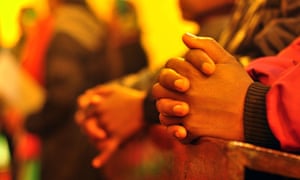
People taking part in Christmas Eve prayers in Srinagar, India. Just over 2% of the country’s population is Christian and nearly 80% is Hindu.
The persecution of Christians in India has risen over the past year, pushing it up a league table of countries where the practice of the faith is a high-risk activity, according to a monitoring organisation.
The world’s second most populous country has risen to No 15 on the 2017 World Watch List, up from 31 four years ago. The list, compiled by Open Doors, is headed by North Korea for the 16th year in a row.
Iraq and Syria slipped down the table, mainly because so many Christians have fled from Islamic State, the main source of persecution and violence. The Christian population of Aleppo has fallen from 400,000 before the Syrian civil war to fewer than 60,000 now, Open Doors estimated.
The Middle Eastern countries were overtaken by Somalia, Pakistan and Sudan. Afghanistan was third on the list, while levels of persecution rose most rapidly in Yemen.
India experienced an escalation of attacks on its Christian minority in 2016, usually led by Hindu nationalists acting largely with impunity. Just over 2% of the country’s population is Christian, and nearly 80% of Indians are Hindu.
There was also an increase in Christian persecution across the region “driven by extreme religious nationalism, which is often tacitly condoned – and sometimes actively encouraged – by local and national governments”, said Lisa Pearce, of Open Doors UK & Ireland.
The watchdog estimated that a church was burnt down or a cleric beaten on average 10 times a week in India in the year to 31 October 2016, a threefold increase on the previous year.
“There is a clear pattern of rising religious intolerance across the Indian sub-continent, which affects many millions of Christians,” said Pearce.
“Religious nationalists attempt to forcibly convert people to the dominant faith of their nation, often turning to violence when community discrimination and non-violent oppression do not succeed in imposing their religious beliefs on minority Christians.
“These Christians are often from the lower castes, such as the Dalits in India who face huge socioeconomic problems. They are an easy target for extreme nationalists.”
In the 25 years that Open Doors has been compiling its annual World Watch List, only three countries have led the table. North Korea has come top 16 times, Saudi Arabia seven times and Somalia twice.
No comments:
Post a Comment